Fleurs du Mal Magazine


Or see the index
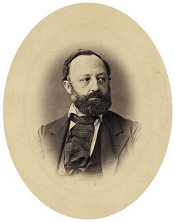
Gottfried Keller
(1819-1890)
Auf den Tod der Luise Scheidegger
Du solltest ruhen und ich störe dich,
Ich störe deine Ruhe, süsse Tote,
Ich wecke dich im kühlen Morgenrote
Und wecke dich, wenn Schlaf die Welt beschlich.
Die in der Morgenfrüh in leisen Schuhen
Die Ruh gesucht und mir die Unruh gab,
Nicht eine Feste ist dein zartes Grab,
Drin du geborgen kannst und sicher ruhen!
Entschwundnes Gut, o Herz voll seltner Güte,
Steh auf und schüttle nur dein nasses Haar!
Tu auf die lieben Äuglein treu und klar,
Gebrochen in des Lenzes reinster Blüte!
Du musst mit meinem Grame schmerzlich kosen,
Solang er wacht, das ist die meiste Zeit!
Erst wenn der Tod mir selber Ruh verleiht,
Magst kehren du, zu ruhn im Wesenlosen.
(1866)
Gottfried Keller poetry
fleursdumal.nl magazine
More in: Archive K-L, Keller, Gottfried
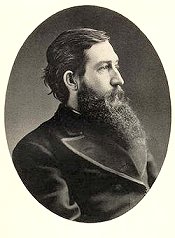
Sidney Lanier
(1842 – 1881)
The Harlequin of Dreams
Swift, through some trap mine eyes have never found,
Dim-panelled in the painted scene of Sleep,
Thou, giant Harlequin of Dreams, dost leap
Upon my spirit’s stage. Then Sight and Sound,
Then Space and Time, then Language, Mete and Bound,
And all familiar Forms that firmly keep
Man’s reason in the road, change faces, peep
Betwixt the legs and mock the daily round.
Yet thou canst more than mock: sometimes my tears
At midnight break through bounden lids — a sign
Thou hast a heart: and oft thy little leaven
Of dream-taught wisdom works me bettered years.
In one night witch, saint, trickster, fool divine,
I think thou’rt Jester at the Court of Heaven!
Baltimore, 1878
Sidney Lanier poetry
fleursdumal.nl magazine
More in: Archive K-L, CLASSIC POETRY

Sidney Lanier
(1842 – 1881)
The Mocking-bird
Superb and sole, upon a plumed spray
That o’er the general leafage boldly grew,
He summ’d the woods in song; or typic drew
The watch of hungry hawks, the lone dismay
Of languid doves when long their lovers stray,
And all birds’ passion-plays that sprinkle dew
At morn in brake or bosky avenue.
What e’er birds did or dreamed, this bird could say.
Then down he shot, bounced airily along
The sward, twitched in a grasshopper, made song
Midflight, perched, prinked, and to his art again.
Sweet Science, this large riddle read me plain:
How may the death of that dull insect be
The life of yon trim Shakspere on the tree?
1877
Sidney Lanier poetry
fleursdumal.nl magazine
More in: Archive K-L, CLASSIC POETRY
Paul Klee
(1879-1940)
Kurzes Leben
Kurzes Leben
Saures Streben
Viel Verdruß
malen muß
verschämt
vergrämt
Riesennatur
Überpartitur
Klavierstuhl hocken
Schütteln die Locken
Paul Klee Gedicht, 1901
fleursdumal.nl magazine
More in: Archive K-L, Expressionism, Klee, Paul
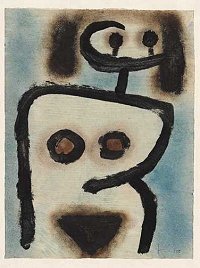
Paul Klee
(1879-1940)
Eveline nenne ich einen grünen Traum . . .
I
Eveline nenne ich einen grünen Traum unter Blättern, den
Traum des nackten Kindes auf der Flur.
Dann aber war mir versagt, so selig wieder zu werden, als ich
unter Menschen kam und nicht mehr fort von ihnen.
Einmal entwand ich mich der Gewalt erfahrener Schmerzen
und entfloh in die mittaglichen Felder und lag am
glühenden Berghang. Da fand ich Evelinen wieder, gereift
aber nicht gealtert. Nur müde von einem Sommer.
Jetzt weiß ich’s. Aber seht, mir ahnte nur, als ich dies sang.
Seid milde zu meiner Gabe. Schrecket nicht die Nacktheit,
die den Schlummer sucht.
II
Der März droht uns Sommer, heiße Liebe drohst Du meiner
Seele, Eveline! Noch grünt der Mai. Noch sind es
Wiegenlieder.
Manches stählerne Wort hab’ ich geschliffen. Ich wollte sein
ein Fels in der Brandung.
Schartig ward die Schneide. Nun möcht ich knien, ganz Demut.
Aber vor wem?
Würmer wollten mich trösten. Bin ich so elend?
Dann ekelt mich.
III
Ach zu viel Sonne ging mir auf! Endlose Tage ohne Nacht.
Ewig singendes Licht. Aufsuchen wollte ich mein
frühes Haus im grünen Schatten, meinen Traum unter
Blättern. Wo ist er?
Kein Verkriechen lügt Abend dem Geblendeten. Flammen reibt
er sich in die Augen.
Es schlief gar nicht der Erwachte. Er spricht ohne Ton:
du müdes Lied.
Dies aber ist es, das müde Lied.
IV
Horch zirpen den Sommer im Feld
horch die heisere Lerche in den Lüften
Eveline. Königin in Tages Mitte.
Nur den Kleinsten ist Fleiß noch beschieden und Tat,
Ameisen, Fliegen und Käfern.
Mich aber lahmt der Friede dieses Mittags. Ich brenne auf
dürrem Lager, auf Thymians und Ericas rankem Teppich bin
ich ganz Brand.
V
Von Mondesmilde weiß ich noch. Nun aber buhlen Fliegen
auf mir, und ich muß es sehen. Es rinnt der Schnee ganz von
den Bergen, ich werde auch dort nicht Kühle finden.
Und ich muß bleiben… Schweigen gebietet Dein Blick, Eveline.
Wir sind Heilige, ich bin’s geworden durch Dich.
VI
Fliehe nicht meine Nähe! Vertraue! Erkenne! Ausgetrocknet
hast Du die Sümpfe meiner Seele, nun steckst Du im
Gewölk. Dein Sieg wird ganz sein.
VII
Wo die Wirklichkeit nicht mehr zu tragen, scheint sie Traum
mit wachen Augen. Daure, fürchterlicher Traum bei Eveline.
O Gaukelbild, daß Du selber versengt bei mir Schutz
suchest und Trost.
VIII
Das ist der große Tag, das glüht von lauter Liebe. Wird auch
hier ein Ende sein, eine Dämmerung? Wird fallen
eine Göttin?
Noch ist es Tag, noch glüht es von lauter Liebe.
Paul Klee Gedicht, 1900
fleursdumal.nl magazine
More in: Archive K-L, Expressionism, Klee, Paul
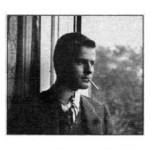
Hans Leybold
(1892-1914)
Ende
Die Wellen meiner bunten Räusche sind verdampft.
Breit schlagen, schwer und müd
die Ströme meines Lebens über Bänke
von Sand.
Mir schmerzen die Gelenke.
In mein Gehirn
hat eine maßlos große Faust sich eingekrampft.
Hans Leybold poetry
fleursdumal.nl magazine
More in: *War Poetry Archive, Archive K-L, Leybold, Hans
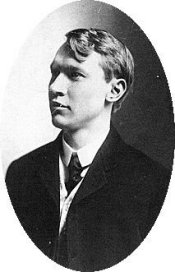
Vachel Lindsay
(1879-1931)
Blanche Sweet
Moving-picture Actress
(After seeing the reel called “Oil and Water”.)
Beauty has a throne-room
In our humorous town,
Spoiling its hob-goblins,
Laughing shadows down.
Rank musicians torture
Ragtime ballads vile,
But we walk serenely
Down the odorous aisle.
We forgive the squalor
And the boom and squeal
For the Great Queen flashes
From the moving reel.
Just a prim blonde stranger
In her early day,
Hiding brilliant weapons,
Too averse to play,
Then she burst upon us
Dancing through the night.
Oh, her maiden radiance,
Veils and roses white.
With new powers, yet cautious,
Not too smart or skilled,
That first flash of dancing
Wrought the thing she willed:—
Mobs of us made noble
By her strong desire,
By her white, uplifting,
Royal romance-fire.
Though the tin piano
Snarls its tango rude,
Though the chairs are shaky
And the dramas crude,
Solemn are her motions,
Stately are her wiles,
Filling oafs with wisdom,
Saving souls with smiles;
’Mid the restless actors
She is rich and slow.
She will stand like marble,
She will pause and glow,
Though the film is twitching,
Keep a peaceful reign,
Ruler of her passion,
Ruler of our pain!
Vachel Lindsay poetry
fleursdumal.nl magazine
More in: Archive K-L, CLASSIC POETRY, Lindsay, Vachel

Sidney Lanier
(1842 – 1881)
Street Cries
Oft seems the Time a market-town
Where many merchant-spirits meet
Who up and down and up and down
Cry out along the street
Their needs, as wares; one THUS, one SO:
Till all the ways are full of sound:
But still come rain, and sun, and snow,
And still the world goes round.
Sidney Lanier poetry
fleursdumal.nl magazine
More in: Archive K-L, CLASSIC POETRY
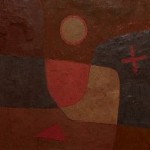
Paul Klee
(1879-1940)
Nachtregen
Etwas lügt, ich habe dich verloren,
fast kann ich es glauben.
Es ist trüb und voll Demut.
Das Herz bäumt sich,
das Auge brennt.
Tränenlos.
Nur die Nacht draußen weint.
Einsamkeit.
Paul Klee Gedicht, 1905
fleursdumal.nl magazine
More in: Archive K-L, Expressionism, Klee, Paul
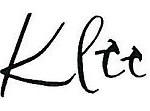
Paul Klee
(1879-1940)
Liebestod im Lenz
Elisabeth: Suche nicht nach meinem Auge,
ich will es nicht haben.
Denn wie sollt’ ich wissen,
was du denkst dabei?
Tadle mich nicht
und noch weniger finde mich schön.
Ich tu was sie gut nennen
und ich will lassen, wovor meine Seele erschrickt.
Mein Weg ist aber umschleiert.
Jag mein Schritt;
und niemand kann mir helfen,
auch Du nicht.
Schon wieder seh ich Deine Augen fragen
und die meinen muß ich niederschlagen.
Wüßtest Du die Qual meiner Seele,
Dich triebe fern, was ich verhehle.
Flieh hin! Laß mich! Denk nicht an mich!
Vergiß, was ich zu Dir sprach! Weh.
Es ist keine Sonne im Lande meiner Seele.
Nur gen Abend liegt eine leichte Röte über den Bergen
und die Nacht ist im Anzug.
Ich hoffte einst auf wonnevolle Tage
und fühlte, mir wäre ein Anrecht darauf gegeben;
aber das war ein Traum des schlummernden Kindes
und erwachend geriet ich ins Dickicht und in die Dornen.
Ich glaubte recht zu tun und hörte sie tuscheln.
So handelte ich in Furcht,
und fand kein Entrinnen aus der Enge.
Mein Gott! Was sollen die langen Jungen
und was wollen die scheelen Blicke nebenaus?
Warum Worte über böse
Tage zu Fall bringen, warum?
Seither ist mein Mut dahin.
Ich fliehe das Neue
und will Vergangenes vergessen.
Ein Schemen bin ich
und könnte ohne Nahrung sein.
Und ach! Wie leise schlägt mein Herz.
Denn der Wellenschlag meiner Liebe
ist nur mehr murmelndes Brunnenrauschen
und mein Leben bald ein neues
und tiefer Schlaf.
Erst abends,
wenn die Nacht will anbrechen,
fahre ich hinaus im Kahn.
Und fernab von den lustigen Schauklern,
wo niemand mich sieht,
da weine ich lang und bitterlich.
[1900]
Paul Klee poetry
fleursdumal.nl magazine
More in: Archive K-L, Expressionism, Klee, Paul

Sidney Lanier
(1842 – 1881)
Clover
Inscribed to the Memory of John Keats
Dear uplands, Chester’s favorable fields,
My large unjealous Loves, many yet one —
A grave good-morrow to your Graces, all,
Fair tilth and fruitful seasons!
Lo, how still!
The midmorn empties you of men, save me;
Speak to your lover, meadows! None can hear.
I lie as lies yon placid Brandywine,
Holding the hills and heavens in my heart
For contemplation.
‘Tis a perfect hour.
From founts of dawn the fluent autumn day
Has rippled as a brook right pleasantly
Half-way to noon; but now with widening turn
Makes pause, in lucent meditation locked,
And rounds into a silver pool of morn,
Bottom’d with clover-fields. My heart just hears
Eight lingering strokes of some far village-bell,
That speak the hour so inward-voiced, meseems
Time’s conscience has but whispered him eight hints
Of revolution. Reigns that mild surcease
That stills the middle of each rural morn —
When nimble noises that with sunrise ran
About the farms have sunk again to rest;
When Tom no more across the horse-lot calls
To sleepy Dick, nor Dick husk-voiced upbraids
The sway-back’d roan for stamping on his foot
With sulphurous oath and kick in flank, what time
The cart-chain clinks across the slanting shaft,
And, kitchenward, the rattling bucket plumps
Souse down the well, where quivering ducks quack loud,
And Susan Cook is singing.
Up the sky
The hesitating moon slow trembles on,
Faint as a new-washed soul but lately up
From out a buried body. Far about,
A hundred slopes in hundred fantasies
Most ravishingly run, so smooth of curve
That I but seem to see the fluent plain
Rise toward a rain of clover-blooms, as lakes
Pout gentle mounds of plashment up to meet
Big shower-drops. Now the little winds, as bees,
Bowing the blooms come wandering where I lie
Mixt soul and body with the clover-tufts,
Light on my spirit, give from wing and thigh
Rich pollens and divine sweet irritants
To every nerve, and freshly make report
Of inmost Nature’s secret autumn-thought
Unto some soul of sense within my frame
That owns each cognizance of the outlying five,
And sees, hears, tastes, smells, touches, all in one.
Tell me, dear Clover (since my soul is thine,
Since I am fain give study all the day,
To make thy ways my ways, thy service mine,
To seek me out thy God, my God to be,
And die from out myself to live in thee) —
Now, Cousin Clover, tell me in mine ear:
Go’st thou to market with thy pink and green?
Of what avail, this color and this grace?
Wert thou but squat of stem and brindle-brown,
Still careless herds would feed. A poet, thou:
What worth, what worth, the whole of all thine art?
Three-Leaves, instruct me! I am sick of price.
Framed in the arching of two clover-stems
Where-through I gaze from off my hill, afar,
The spacious fields from me to Heaven take on
Tremors of change and new significance
To th’ eye, as to the ear a simple tale
Begins to hint a parable’s sense beneath.
The prospect widens, cuts all bounds of blue
Where horizontal limits bend, and spreads
Into a curious-hill’d and curious-valley’d Vast,
Endless before, behind, around; which seems
Th’ incalculable Up-and-Down of Time
Made plain before mine eyes. The clover-stems
Still cover all the space; but now they bear,
For clover-blooms, fair, stately heads of men
With poets’ faces heartsome, dear and pale —
Sweet visages of all the souls of time
Whose loving service to the world has been
In the artist’s way expressed and bodied. Oh,
In arms’ reach, here be Dante, Keats, Chopin,
Raphael, Lucretius, Omar, Angelo,
Beethoven, Chaucer, Schubert, Shakespeare, Bach,
And Buddha (sweetest masters! Let me lay
These arms this once, this humble once, about
Your reverend necks — the most containing clasp,
For all in all, this world e’er saw!) and there,
Yet further on, bright throngs unnamable
Of workers worshipful, nobilities
In the Court of Gentle Service, silent men,
Dwellers in woods, brooders on helpful art,
And all the press of them, the fair, the large,
That wrought with beauty.
Lo, what bulk is here?
Now comes the Course-of-things, shaped like an Ox,
Slow browsing, o’er my hillside, ponderously —
The huge-brawned, tame, and workful Course-of-things,
That hath his grass, if earth be round or flat,
And hath his grass, if empires plunge in pain
Or faiths flash out. This cool, unasking Ox
Comes browsing o’er my hills and vales of Time,
And thrusts me out his tongue, and curls it, sharp,
And sicklewise, about my poets’ heads,
And twists them in, all — Dante, Keats, Chopin,
Raphael, Lucretius, Omar, Angelo,
Beethoven, Chaucer, Schubert, Shakespeare, Bach,
And Buddha, in one sheaf — and champs and chews,
With slantly-churning jaws, and swallows down;
Then slowly plants a mighty forefoot out,
And makes advance to futureward, one inch.
So: they have played their part.
And to this end?
This, God? This, troublous-breeding Earth? This, Sun
Of hot, quick pains? To this no-end that ends,
These Masters wrought, and wept, and sweated blood,
And burned, and loved, and ached with public shame,
And found no friends to breathe their loves to, save
Woods and wet pillows? This was all? This Ox?
“Nay,” quoth a sum of voices in mine ear,
“God’s clover, we, and feed His Course-of-things;
The pasture is God’s pasture; systems strange
Of food and fiberment He hath, whereby
The general brawn is built for plans of His
To quality precise. Kinsman, learn this:
The artist’s market is the heart of man;
The artist’s price, some little good of man.
Tease not thy vision with vain search for ends.
The End of Means is art that works by love.
The End of Ends . . . in God’s Beginning’s lost.”
Summer of 1876
Sidney Lanier poetry
fleursdumal.nl magazine
More in: Archive K-L, CLASSIC POETRY, Keats, John

Gottfried Keller
(1819-1890)
Die kleine Passion
Der sonnige Duft, Semptemberluft,
sie wehten ein Mücklein mir aufs Buch.
Das suchte sich die Ruhegruft
und fern vom Wald sein Leichentuch.
Vier Flügelein von Seiden fein
trug’s auf dem Rücken zart,
drin man im Regenbogenschein
spielendes Licht gewahrt!
Hellgrün das schlanke Leibchen war,
hellgrün der Füßchen dreifach Paar,
und auf dem Köpfchen wundersam
saß ein Federbüschchen stramm;
die Äuglein wie ein goldnes Erz
glänzten mir in das tiefste Herz.
Dies zierliche und manierliche Wesen
hatt’ sich zu Gruft und Leichentuch
das glänzende Papier erlesen,
darin ich las, ein dichterliches Buch;
so ließ den Band ich aufgeschlagen
und sah erstaunt dem Sterben zu,
wie langsam, langsam ohne Klagen
das Tierlein kam zu seiner Ruh.
Drei Tage ging es müd und matt
umher auf dem Papiere;
die Flügelein von Seide fein,
sie glänzten alle viere.
Am vierten Tage stand es still
gerade auf dem Wörtlein “will”!
Gar tapfer stand’s auf selbem Raum,
hob je ein Füßchen wie im Traum;
am fünften Tage legt’ es sich,
doch noch am sechsten regt’ es sich;
am siebten endlich siegt’ der Tod,
da war zu Ende seine Not.
Nun ruht im Buch sein leicht Gebein,
mög’ uns sein Frieden eigen sein!
Gottfried Keller poetry
fleursdumal.nl magazine
More in: Archive K-L, Keller, Gottfried
Thank you for reading Fleurs du Mal - magazine for art & literature